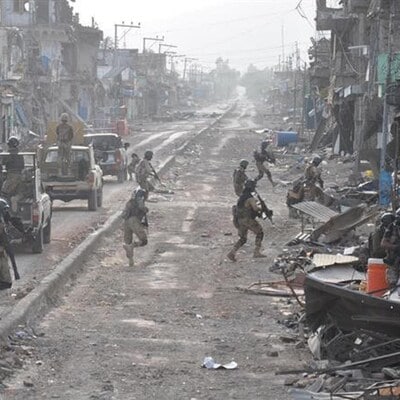Even as Pakistani law enforcement agencies have completed their investigation into the Dasoo terror attack, Beijing is not satisfied with Islamabad’s efforts to protect Chinese nationals working in Pakistan and ensure security for the China-Pakistan Economic Corridor (CPEC) project.
The attack was carried out by the Pakistan Taliban (TTP) in March and left five Chinese nationals dead.
Click here to connect with us on WhatsApp
Not satisfied with Pakistan’s response so far, China wants Pakistan to launch a major counter-terrorism operation against militants who have been targeting Chinese people in the country, similar to Operation Zarb-e-Azb, which the Pakistani military launched in June 2014 and lasted for two years, according to an article by security analyst Muhammad Amir Rana published in Pakistani newspaper Dawn on Sunday.
Reports of China’s demands come just two days before Pakistani Prime Minister Sharif begins a five-day visit to China on June 4. During the visit, Pakistan and China are likely to explore strengthening cooperation under the multi-billion dollar CPEC project.
Such a demand seems difficult for Pakistan, which is facing a serious economic crisis, given the human and economic costs of Operation Zarb-e-Azb.
The massive operation will cost Pakistan billions of dollars
On the second anniversary of Operation Zarb-e-Azb in June 2016, the Pakistani military announced that 490 Pakistani soldiers and 3,500 militants had been killed during the two-year operation.
In January 2017, Maria Saifuddin Effendi, a security analyst at the National Defense University, Islamabad, revealed that Operation Zarb-e-Azb had cost the Pakistani military $1.9 billion in losses.
Meanwhile, in June 2016, a Pakistani military spokesman claimed that Pakistan had suffered economic losses of $107 billion due to militant activity in the region since the 9/11 attacks on the United States.
Pakistan’s finance ministry and the International Monetary Fund (IMF) announced on April 29 that lenders had approved the “immediate disbursement” of a $1.1 billion tranche that will complete the loan of a total of $3 billion agreed under the agreement in 2023.
Pakistan secured an IMF bailout in June last year, helping it avoid defaulting on its sovereign debt.
However, Pakistan has a history of launching security operations at China’s request.
A report in Sunday’s Dawn newspaper noted that the 2007 Lal Masjid operation in Islamabad was launched after then Chinese president Hu Jintao called Pakistan’s then president Pervez Musharraf. China requested the operation after a female student from the Jamia Hafsa Madrasa had reportedly kidnapped a Chinese medical worker.
According to the report, the Pakistani military launched Operation Zarb-e-Azb in 2014, partly due to international pressure, including from China.
Pakistan’s cross-border operations could spark a large-scale conflict in the region, the report warned, adding that the insurgency in Balochistan, which is also targeting CPEC projects, needs to be handled carefully. An “unfortunate event” could impose “significant political and security costs” on Pakistan, the report said.
Why is China angry at Pakistan?
Ayesha Siddiqa, a senior research fellow at the School of War Studies at King’s College London, wrote in Nikkei Asia in April that Beijing has asked Islamabad for permission to send Chinese personnel to provide security for 1,200 Chinese workers in Pakistan.
Pakistan had not agreed to the demands as of late April, according to Siddiqa, who previously served as director of naval studies for the Pakistan Navy.
Clearly, Beijing is not happy with the performance of Pakistan’s 12,000-strong army and navy force, established in 2016 to protect CPEC projects.
CPEC has faced numerous setbacks over the years, including security threats. Already this year, there have been at least three high-profile attacks targeting CPEC-related workers, projects or locations.
On March 26, the TTP attacked a Chinese convoy travelling from Islamabad to the Das Hydroelectric Project site in Khyber Pakhtunkhwa, killing five Chinese.
China condemned the attack on engineers working on CPEC projects and demanded a “thorough investigation.”
Pakistan immediately formed a joint investigation team of police and intelligence officials to address Chinese concerns about Pakistani agencies’ ability to investigate high-profile terror attacks.
The Pakistani government also announced it would pay $2.5 million in compensation to the families of the five Chinese nationals killed in the attack.
In late May, Pakistani authorities arrested 11 TTP militants involved in the March attacks.
The Das incident comes in the wake of an increase in attacks on CPEC-related targets.
Located in Turbat city, Balochistan, PNS Siddique is Pakistan’s second largest naval air base and one of its primary functions is to provide support to CPEC projects.
Heavy gunfire and explosions occurred during the March 20 attack on the Gwadar Port Authority complex, a key part of the CPEC project.
What is at stake for Pakistan?
Pakistan urgently seeks investments from friendly countries, which in turn want a completely secure environment for their investments.
Besides China, Saudi Arabia also has similar security concerns regarding its investments in Pakistan, according to Dawn.

